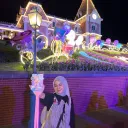Kowloon offers halal‑certified options for every craving Muslim travellers!
3-Day Halal-Friendly Mindanao Adventure Itinerary
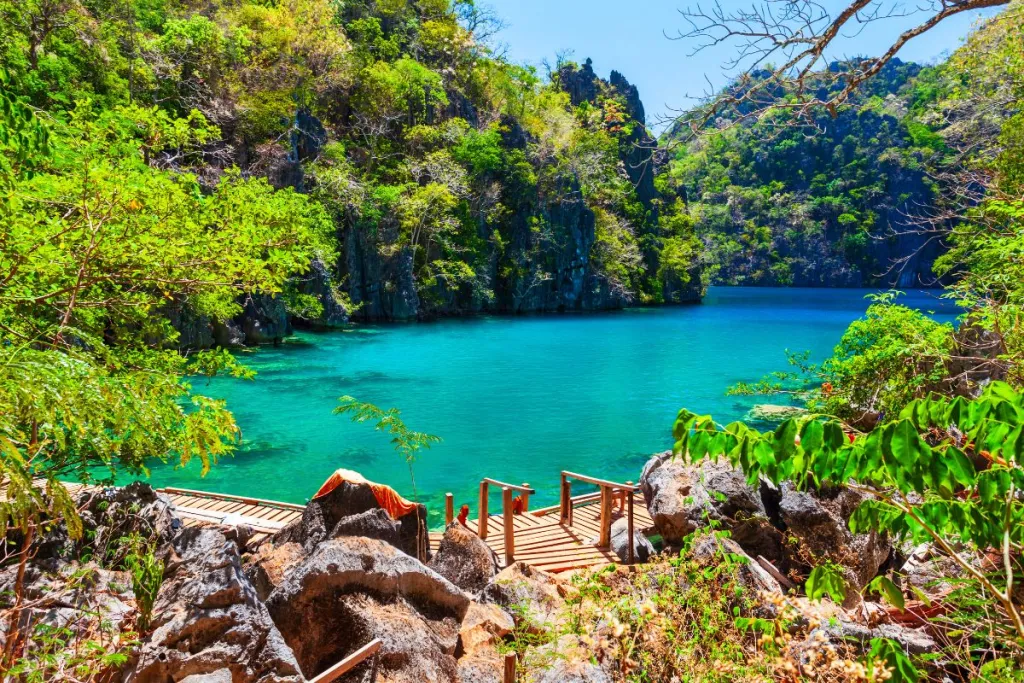
When travellers think of the Philippines, iconic destinations like Boracay, Palawan, and Cebu often come to mind. Cradled in the country’s southern reaches lies Mindanao, a quiet wonder blessed with natural beauty, vibrant culture, and deep spiritual roots.
Even better, Mindanao is one of the most Muslim-friendly regions in the Philippines. From halal food stalls and welcoming mosques to indigenous communities that honour modest lifestyles, it offers a soulful journey for travellers seeking thrill, tranquillity, faith-based peace of mind and spiritual serenity.
In this 3-day halal itinerary, Muslim travellers will find not only stunning landscapes—from enchanted rivers to pink sand beaches—but also places to pray, eat halal, and connect with locals in meaningful ways.
Discover the soulful beauty and hidden gems of Mindanao!
Mindanao is more than just lush landscapes and scenic lakes—it's a destination where culture, nature, and spirituality come together in harmony. From mystical rivers and majestic waterfalls to vibrant indigenous villages and pink sand beaches, every stop offers a chance to reconnect with both nature and faith.
Also read: 10 Muslim-Friendly Airbnb in Manila, Philippines
Day 1: Explore Surigao del Sur → Enchanted Waters → Tinuy-an Falls
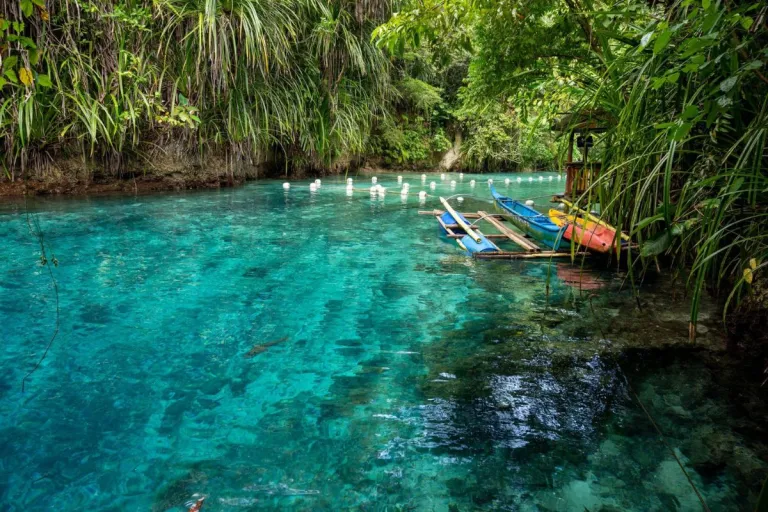 Image credit: Tourism Promotions Board (TPB) Philippines
Image credit: Tourism Promotions Board (TPB) Philippines
The journey begins early in the morning. Travellers can fly into Butuan Airport, the gateway to Surigao del Sur, from either Manila or Cebu (as there’s a direct flight from Cebu to Butuan). Meanwhile, if travellers are coming from Davao, they will take the land trip. It’s a good idea to grab a packed breakfast from Al-Munawarah Halal Mart in Butuan before hitting the road — it’s a long drive ahead, but absolutely worth it.
After around 3.5 hours on the road, the first destination awaits: the Enchanted River in Hinatuan. With its mesmerising electric-blue waters and mysterious depths, this river has long been the subject of local folklore. Visitors can swim, take photos, or simply sit by the edge and absorb the serene surroundings.
By midday, it’s time for lunch. While halal-certified restaurants may be limited in the area, a local carinderia (eatery) can prepare simple dishes like grilled fish or chicken with rice — just double-check that no haram ingredients are used.
The next stop is Tinuy-an Falls, roughly 1.5 hours away from the river. This multi-tiered waterfall is an incredible sight to behold. Visitors can ride a bamboo raft close to the cascading water for a fun splash and that perfect Instagram moment.
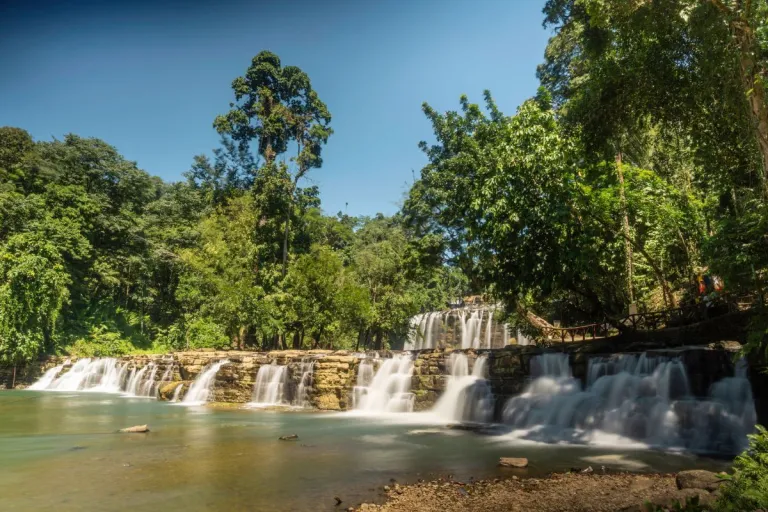 Image credit: Tourism Promotions Board (TPB) Philippines
Image credit: Tourism Promotions Board (TPB) Philippines
Come evening, travellers can settle into a modest homestay in Bislig City, a laid-back town surrounded by nature. Just before dinner, it’s easy to find a quiet space to perform Maghrib prayer at the Bislig Mosque. The local Muslim community is small but welcoming.
Dinner can be enjoyed at Al-Nor Eatery, a local gem that serves Tausug favourites such as piyanggang manok (blackened chicken in coconut milk) and satti (grilled skewers in spicy sauce).
HalalZilla Tip: Pack a small prayer mat and a spray bottle for wudu, especially for rural areas. Many locals gladly offer a private space for prayer if asked politely.
Day 2: Lake Sebu → Seven Falls Zipline → T’boli weaving village
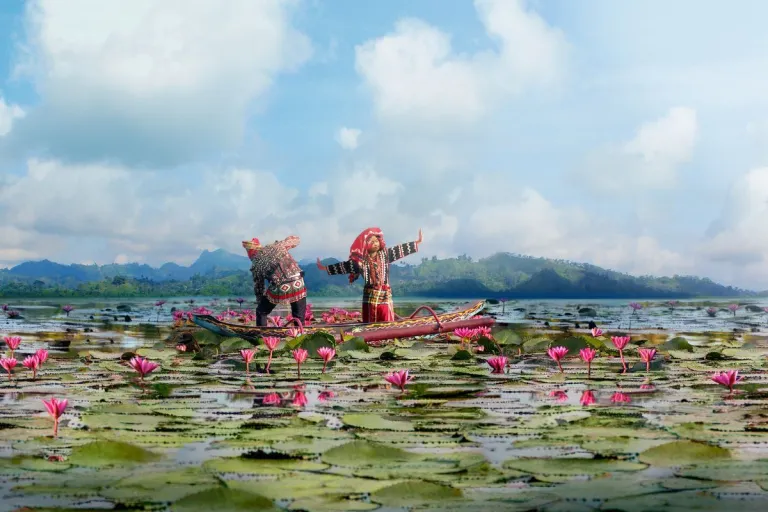 Image credit: Tourism Promotions Board (TPB) Philippines
Image credit: Tourism Promotions Board (TPB) Philippines
The second day begins with a 4-hour road trip to Lake Sebu in South Cotabato. Though it’s a bit of a journey, travellers are rewarded with fresh mountain air, peaceful lake views, and a deep dive into T’boli culture.
Upon arrival, it’s best to check in at a halal-aware lodge such as Punta Isla Lake Resort, known for its scenic location right by the lake.
Before lunch, the adventure kicks in with a ride on the Seven Falls Zipline, one of the tallest in Southeast Asia. Gliding through the sky, riders pass over stunning waterfalls and dense forest—a breathtaking experience for adrenaline seekers.
Lunch is served by the lake. Travellers can request halal dishes like sinigang na tilapia—a tangy fish soup made with fresh lake tilapia simmered in a sour broth. It is the perfect way to recharge after the morning’s zipline adventure.
In the afternoon, the pace slows for a deeper cultural immersion. A visit to a T’boli weaving village offers a glimpse into the community’s spiritual artistry. Here, artisans craft T’nalak—a sacred cloth woven from abaca fibres, believed to be inspired by dreams. Buying a scarf or bag not only makes for a unique souvenir but also directly supports the preservation of this indigenous tradition.
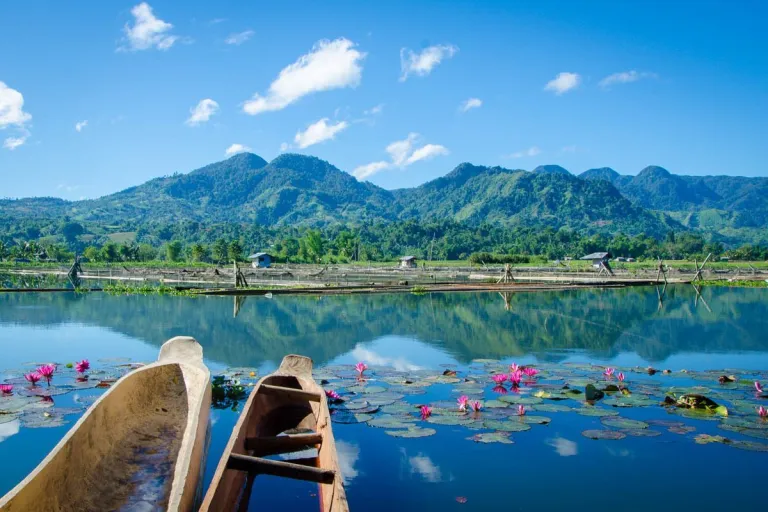 Image credit: Wikimedia Commons
Image credit: Wikimedia Commons
As the afternoon winds down, the journey turns serene with a paddleboat ride on Lake Sebu - a peaceful escape, perfect for reflection and sunset views.
As the sun sets, the evening winds down with a comforting meal served at the resort. While the resort offers halal options, it’s always wise to pre-request halal meals or pack a few halal-certified instant meals just in case.
HalalZilla Tip: The T’boli are mostly non-Muslim but are incredibly respectful of other faiths. Dress modestly, ask before taking photos, and don’t hesitate to strike up a friendly conversation—they’re proud to share their heritage.
Day 3: Zamboanga City → Pink sand beaches → Islamic heritage
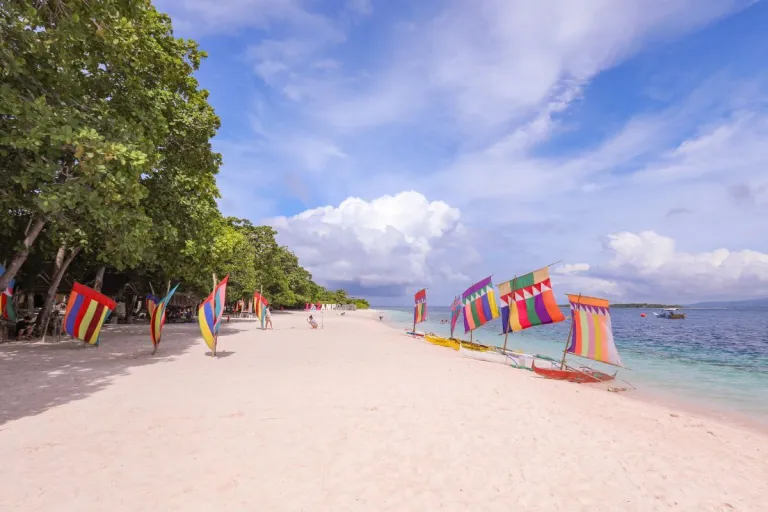 Image credit: Tourism Promotions Board (TPB) Philippines
Image credit: Tourism Promotions Board (TPB) Philippines
The final day of this Mindanao adventure kicks off with a flight to Zamboanga City, a coastal gem rich in Muslim heritage and known for its vibrant cultural fusion.
Upon landing, a hearty halal breakfast at Satti Haus 21 awaits. This no-frills eatery is popular with the locals and serves beef satti—spicy skewered beef served with sticky rice rolls and rich peanut sauce.
Next, there is a 30-minute boat ride to Great Santa Cruz Island. This rare pink sand beach, coloured by crushed red organ pipe coral, is both dreamy and Instagram-worthy. Travellers can swim, snorkel, or simply relax in one of the beach huts.
Food vendors are limited on the island. It is best to bring pre-packed halal meals from Zamboanga for a convenient picnic lunch.
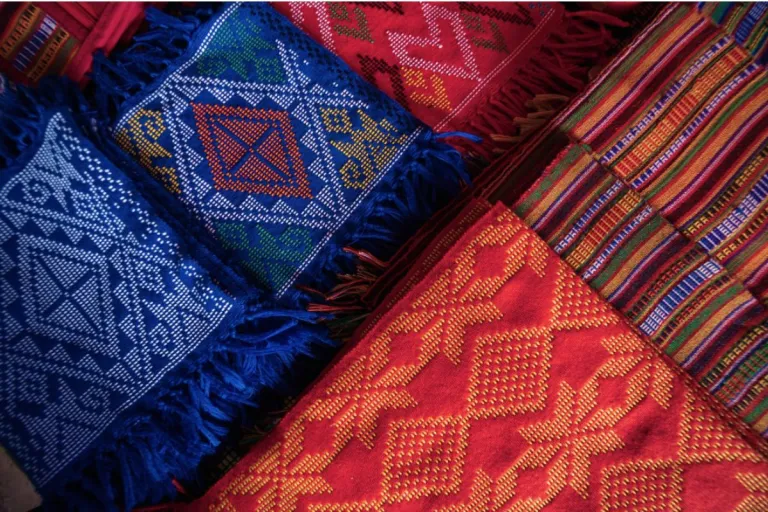 Image credit: Department of Tourism
Image credit: Department of Tourism
In the afternoon, the itinerary brings travellers back to the city to explore Fort Pilar, a Spanish-era shrine that blends Christian and Muslim cultural symbols. Not far from here is the Yakan Weaving Village, where one can browse colourful traditional fabrics and support local Muslim artisans.
For Asr prayer, a visit to the impressive Zamboanga City Grand Mosque provides a moment of calm and connection. It’s one of the largest mosques in the region and a symbol of the city’s Islamic heritage.
The trip concludes with dinner at Al-Mashawi Restaurant, which serves a delicious fusion of Middle Eastern and Filipino halal dishes—the perfect farewell meal before heading to the airport.
HalalZilla Tip: While Mindanao often appears in travel advisories, areas like Zamboanga City and Lake Sebu are generally safe for travellers, especially when accompanied by a guide or local host.
Essential tips for Muslim travellers in Mindanao
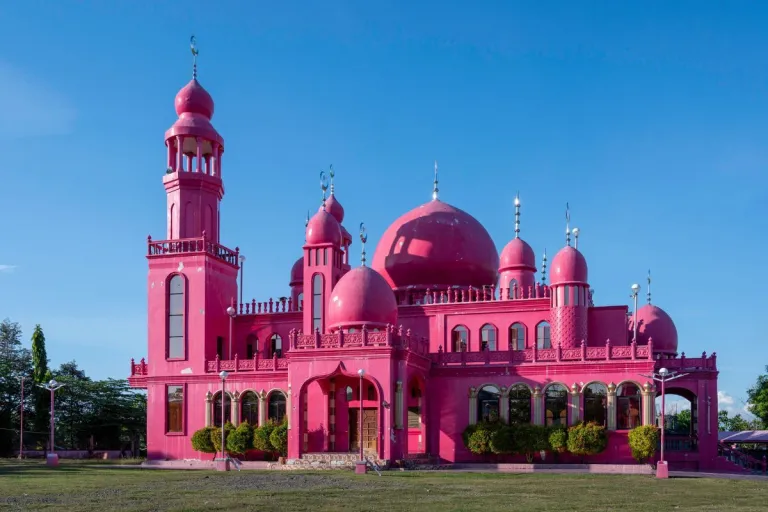 Image credit: Tourism Promotions Board (TPB) Philippines
Image credit: Tourism Promotions Board (TPB) Philippines
Travelling through Mindanao can be an incredibly fulfilling experience for Muslim travellers, especially with a bit of thoughtful preparation. In more remote areas, halal-certified eateries may not always be available, so it’s wise to pack a few essentials like halal trail mixes, dried fruits, or instant noodles. These will definitely come in handy during long road trips or island excursions.
When it comes to performing prayers on the go, digital tools can be a big help. Apps such as Muslim Pro or Ummah are excellent for finding nearby mosques and keeping track of prayer times. Carrying a small, lightweight prayer mat and a spray bottle for wudu will make it easier to pray anywhere, especially in outdoor or public spaces where water access might be limited.
Modest clothing is recommended not only for religious reasons but also for comfort and cultural sensitivity. Lightweight, long-sleeved outfits are ideal for Mindanao’s tropical climate, keeping you cool while remaining appropriately covered. It’s also worth noting that locals—especially in indigenous and Muslim communities—greatly appreciate modest attire.
If you’re booking activities or accommodations, consider going through local Muslim-friendly travel agencies or working with licensed guides familiar with halal needs. They can recommend trusted places to eat, pray, and stay, ensuring a more seamless and spiritually fulfilling trip.
Lastly, always be respectful when interacting with locals. Whether visiting a T’boli weaving village or exploring a mosque, a little kindness and courtesy go a long way. Always ask before taking someone’s photo, particularly in traditional communities, and be open to learning from the people you meet. After all, the heart of halal travel lies in connection—not just with the destination, but with the people who call it home.
Also read: 10 Best Halal-Friendly Destinations in The Philippines for Muslim Travellers
Halal travel meets soulful adventure in Mindanao
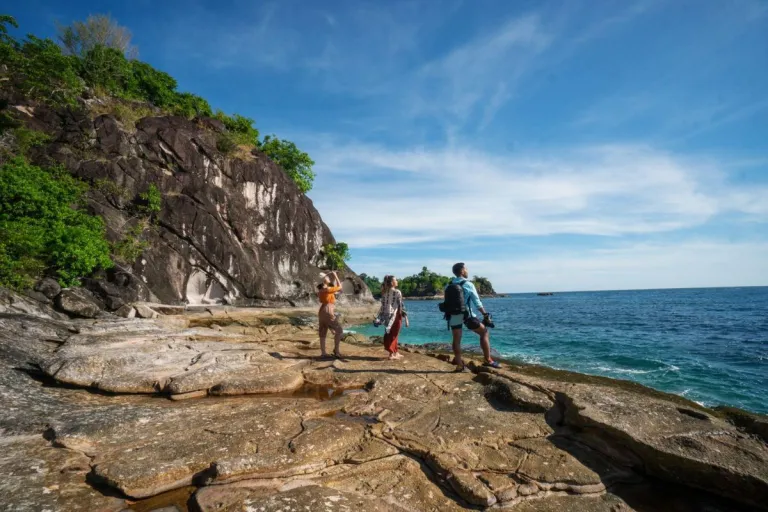 Image credit: Tourism Promotions Board (TPB) Philippines
Image credit: Tourism Promotions Board (TPB) Philippines
Mindanao isn’t just a destination—it’s a journey that speaks to the soul. For Muslim travellers, it offers more than sights; it provides a sense of belonging, reverence, and connection.
From diving into the Enchanted River, learning about the T’boli’s dreamweaving traditions, to walking along the pink shores of Zamboanga, every moment feels purpose-filled.
Discover the soulful beauty and hidden gems of Mindanao!
Mindanao is more than just lush landscapes and scenic lakes—it's a destination where culture, nature, and spirituality come together in harmony. From mystical rivers and majestic waterfalls to vibrant indigenous villages and pink sand beaches, every stop offers a chance to reconnect with both nature and faith.
So pack your prayer mat, sense of wonder, and appetite for adventure—Mindanao is calling!
_____________________________________________________________________________________________
Brought to you by the Tourism Promotions Board (TPB) Philippines
Published at
About Author
Aimi Zulkiflee
Subscribe our Newsletter
Get our weekly tips and travel news!
Recommended Articles
15 Best Halal Foods in Kowloon, Hong Kong Top Muslim-Friendly Things to Do at The Newest Antara Genting Highlands It’s located between Peacehaven Campsite and Cradle Rock Genting Highlands, along Jalan Utama Genting Highlands
10 Best Halal-Friendly Destinations in The Philippines for Muslim Travellers Not just Boracay...
10 Best Halal Restaurants in Pattaya Serving Authentic Thai Cuisine Let's try Halal Authentic Thai Cuisine in Pattaya
10 Best Places for Muslim Travellers to See Tulip Festivals in 2025 Fun Fact: Tulips didn’t actually come from the Netherlands but Türkiye!
Latest Articles
Sapporo Winter Festival 2026: The Ultimate Guide for Muslim Travellers Get ready for the biggest winter festival in Japan!
10 Spots to Find the Most Authentic Halal Pho in Ho Chi Minh City, Vietnam Here are our favorite spots for authentic Halal Pho in Saigon.
10 Family-Friendly Theme Parks in Bandung for an Unforgettable Getaway From cozy indoor spaces to spots offering breathtaking natural views of Bandung.
8 Must-Stay Hotels in Canada with the Most Stunning Natural Views you need a room with a view!
Exploring Iconic Canada: From Dreamy Aurora Views to Trending K-Drama Filming Spots you might have spotted the breathtaking landscapes in Canada

